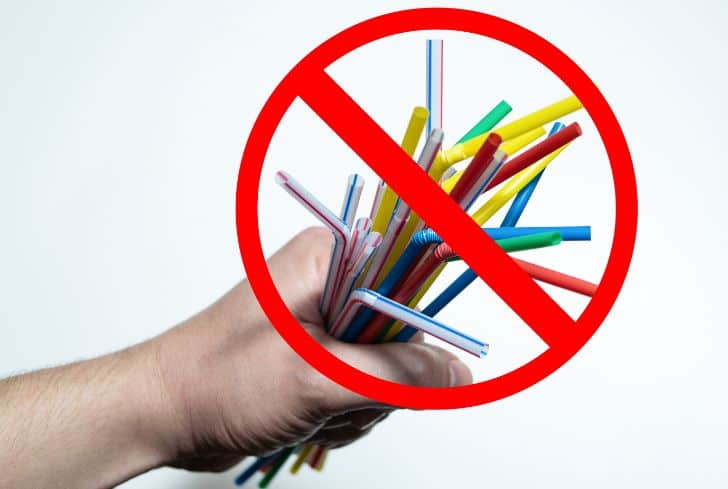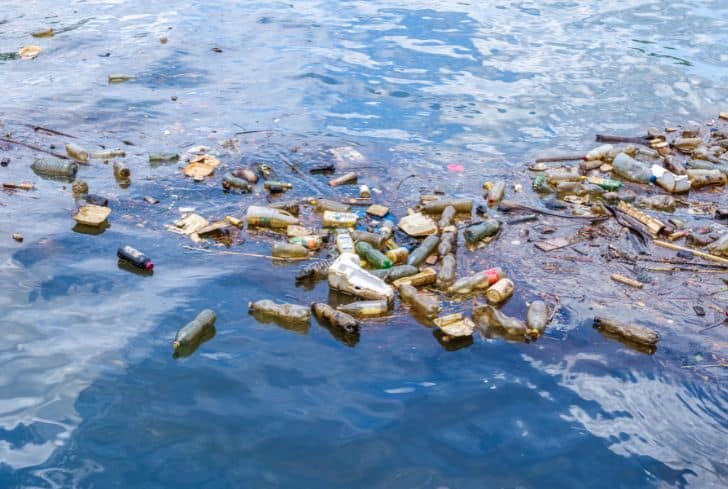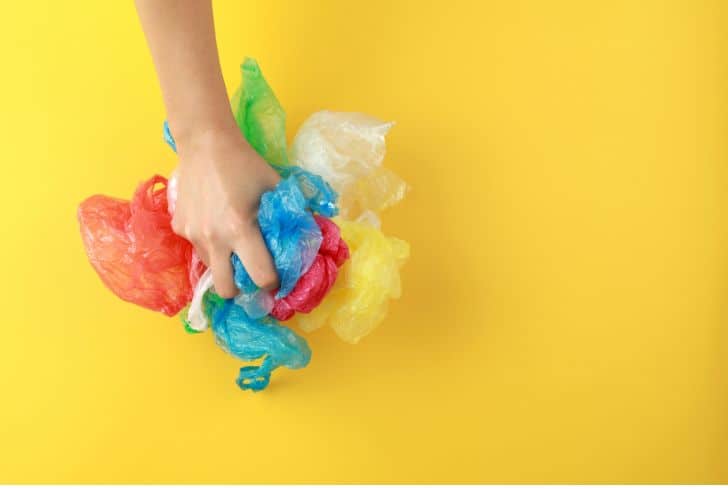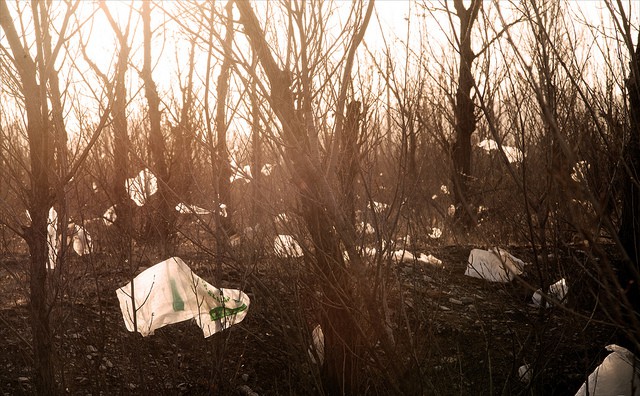Plastic bags are everywhere in our environment. When we purchase our groceries, plastic bags are usually our go-to option, thanks to their high convenience.
In fact, these bags have become part of our modern life. But then, the convenience of these plastic bags comes at a very high cost to the environment and negatively affects human health.
Several cities globally have begun banning plastic bags, while some have enforced restricted laws against their use, and that’s because of the negative effects of their usage.
Several countries, including China, have taken huge steps to ban plastic bags and single-use plastics like plastic straws. Meanwhile, Bangladesh and India have only prohibited the use and sale of polythene bags, which basically have a thickness of fewer than 50 microns.

25+ Powerful Reasons Why Plastic Bags Should Be Banned
Below are some of the 25+ reasons why plastic bags should be banned from our cities.
1. Plastic bags pollute not only our water but also our land
Plastic bags are usually lightweight, so they can travel very long distances by either water or wind. The wind blows these plastic bags trashing the environment and sometimes eventually moving to the world’s oceans.
2. Plastic bags are made from non-renewable sources and, on this account, highly contribute to climate change
Most of the plastic is made of polypropylene, manufactured from petroleum and natural gas. These are non-renewable fossil fuel-based materials whose extraction and production produce greenhouse gases, further contributing to global climate change.
3. A lot of energy is used in producing these bags
Did you know that the total energy required to drive a car for one kilometer or 0.5 miles is the equivalent energy required to produce nine plastic bags? Well, that’s true!
And honestly, it doesn’t make much sense to have all these non-renewable resources directed into making something whose useful life is around 12 minutes.
4. Plastic bags do not degrade
It doesn’t matter what you’ve read on those packages or heard an expert say; in truth, petroleum-based plastic bags never degrade, at least not sticking to the standard definition of “degradation”.
Instead, they photo-degrade (after many years) into tiny pieces (called microplastics) that are eventually swept into the oceans. These tiny bits of plastic are then consumed by wildlife while the rest remain afloat in our oceans.
Statistically speaking, approximately 46,000-1,000,000 plastic fragments are estimated to float within every square mile of the globe’s oceans.

5. Plastic bags are toxic
The plastic bags are filled with toxic, harmful chemicals that include estrogen-like substances.
An Environmental Health Perspectives report disclosed that plastic has hormone-mimicking qualities, and the plastic products released chemicals that mimicked estrogen.
This is dangerous because it means that plastic can disrupt how hormones, such as estrogen and others, behave in our bodies, causing a hormonal imbalance that can have severe effects on our health.
6. Plastic bags are harmful to wildlife and marine life
Birds, animals, and marine life, such as sea turtles and fish, often mistake plastic bags and other plastic materials for food and consume them.
Once that happens, their digestive system gets congested, leading to the development of health infections and death due to suffocation. The animals may also become easily entangled inside the plastic.
A study found that almost 35 percent of turtle deaths are caused by the animals ingesting plastic, Green Tumble reports. As per ABC News reports, a 2008 crocodile autopsy in Australia found 25 bags in its stomach.

And that’s not all yet — according to another report by National Geographic, nearly every single seabird is eating plastic, as plastic that’s thrown away is found in 90 percent of them.
As the Ellen MacArthur Foundation reports, if we don’t slow down the production and waste of plastic bags, the future looks grim: by the year 2050, there will be more plastic in the ocean than fish.
7. Plastic bags are harmful to human health
There are some chemicals in plastic bags that can disrupt the normal functioning of hormones in the body. Most plastic fragments in the oceans, like plastic bags, have some pollutants, such as PCBs (polychlorinated biphenyl) and PAHs (Polycyclic aromatic hydrocarbons), which are hormone-disrupting.
Once the marine animals consume these chemicals, they move through the food web and later into the humans, who consume fish together with other marine animals. The chemical materials bio-accumulate in the sea animals and fish system as they are exposed to them in the ocean waters.
When humans prepare them, they consume all these chemicals affecting their healths. They could develop cancers or other serious conditions.
8. Plastic bags are expensive and hard to clean or remove from the environment
The cost of plastic bag cleanup is around 17 cents per bag; thus, on average, the taxpayers end up paying about $88 each year just on plastic bag waste.
Cities and other jurisdictions spend millions of dollars each year to maintain landfills. Therefore, taxpayers are spending their money on storing plastic bags forever.
These plastic bags also cost 3-5 cents each. Thus, the plastic considered free is not free, after all. Individuals pay a lot to purchase them and even to reuse them.
9. Plastic bags have external costs
Several costs are attributed to the production of plastic bags. A prime example is production and environmental costs.
10. Plastic bags are used in extremely high volumes
One of the biggest problems with plastic carryout bags is the huge volume of bags being used. In 2008, according to the U.S. Dept. of Commerce, the United States consumed 102.1 billion “polyethylene retail carrier bag” (PRCBs) in one year.
According to the U.S. Census Bureau, every household in the nation used approximately 885 plastic bags per year, or 17 plastic bags per week.
Since one grocery bag sized reusable bag will hold up to four plastic bags of goods when packed properly, only four reusable bags are needed to eliminate those 17 plastic bags per week. If every U.S. household used four reusable bags each week, 102 billion plastic bags could be eliminated.
11. Plastic bags are not easy to recycle
If all plastic were recycled, that would be much better. But unfortunately, that’s not the case.
Plastic bags are said to present a significant challenge in terms of recycling. Most recycling facilities do not have the capacity to recycle plastic bags and thus do not accept them.
12. Consumers will not recycle plastic bags
The true way to dispose of plastic bags is to recycle them. According to the latest stats from the U.S. Environmental Protection Agency (EPA), only about 12% of plastic carryout bags are recycled.
That’s to say that consumers toss a whopping 88% of these bags either into the trash or leave them scattered in the environment, which really is sad!
13. Plastic carry bags are disposable rather than reusable
Plastic carry bags are designed and manufactured to be disposable rather than reusable. Thin-film plastic carryout bags are less than 2.25 mils in thickness.
These extremely thin and lightweight plastic carryout bags carry their weight 100 times over and more. Surveys have shown that a plastic carryout bag is used for approx. 12 minutes and then it is discarded.

Some are reused a few times, but the majority are tossed immediately. 88% of plastic bags are disposed of improperly, and only 12% of plastic carryout bags are recycled, according to the EPA.
14. Plastic bags clog stormwater drains
Plastic bags can cause serious problems in other ways. Eventually, the bags will blow around until they are caught by stormwater drains and end up clogging water drainage channels and sewers.
In Bangladesh and India, plastic bags are blamed for clogging storm drains and causing floods in both countries, mainly during monsoons. The U.S., San Jose, CA, and other cities also had severe problems with plastic bags clogging storm drains.
15. Plastic bags tend to last more; perhaps forever, and we even use so many of them
Plastic bags never degrade completely, which shows that as more of them are produced by companies, more are introduced into the environment.
Therefore, the more the amount of plastic bags, the more there is plastic pollution and its effects. Banning the use of plastic bags will help reduce this great effect.
16. Even if we decided to recycle plastic bags, these materials still end up in oceans and landfills
Recycling plastic bags does not affect the fact that they will still be dumped into the environment and end up in either landfills or oceans. These recycled plastic bags are not degradable and cause the same effects as non-recycled plastic bags.
17. Plastic bags contribute to over-burdened landfills
Municipal solid waste (MSW) includes all residential, commercial, and business trash hauled away each week by the garbage man, of which 18% was plastic waste, not just bags.
Reportedly, after the recovery of materials in the waste stream by recycling and composting, more than a hundred million tons of MSW were discarded, of which 18% were plastics. About 3% of plastic waste is plastic bags, and those were placed in already overburdened landfills.
18. These plastic bags are impacting the environment negatively in that they are making the Great Pacific garbage patch bigger every minute
Most of the plastic materials find their way into waterways once released into the environment, and once they are there, they are dumped into oceans.
The Great Pacific Ocean is one such area negatively affected by all the plastic material. The more they are thrown into the oceans, the more they increase, causing the garbage patch to increase in size.
19. Bans should be adopted because they are greatly effective at reducing big plastic waste
China banned plastic bags, and four years later, the amount of plastic bags thrown into the environment had reduced by 40 billion. Similarly, if the U.S. bans plastic bags, there would be fewer landfills.
20. Plastic bags help keep our streets clean
Most of our cities are not clean, especially Indian and most African country streets, because people don’t care to know where they throw their garbage.
Plastic bags are an eye-sore and unsightly litter along our highways. They do it in water bodies, streets, and in landfills. These wastes litter our streets, making them look ugly, and affecting their aesthetic value.
21. It helps spread awareness
When we ban plastic bags, we keep our environment clean and, at the same time, send some message globally about the importance of environmental protection. People learn that banning plastic is for a reason, and they can take up such important information.
They can subsequently begin to understand that plastic causes some negative effects, and the environment and humans need protection against them.
22. With a ban on plastic bags, there would be improved technology which would boost other businesses
With such a ban, society would be required to produce some more sophisticated bags. Great manpower will be required by the manufacturing factories to make eco-friendly and greener materials.
23. Banning plastic bags helps save money
These plastics cost a lot of money because the final costs account for the total production costs from their manufacture using petroleum to when they will be thrown away.
24. People are ready for the ban, and thus, it should be adopted
People have seen how many plastic bags have adverse effects on their health and environment, and thus, they have desired and opted for change. This change is the use of eco-friendly materials.
25. By banning plastic bags, people will learn to support local workers together with green industries
There are several alternatives to plastic bags. However, it’s only after they are banned that people will move towards greener alternatives. This is needed to support local industries that produce green products.
26. People can opt for manufacturing reusable bags so that they create sustainable products
Manufacturing reusable bags will create new job opportunities in terms of green manufacturing, research, and processing of packaging products.
27. Other nations are banning the use of plastic because they have noticed that it is causing harm to the environment and human health
Currently, over 40 nations, together with municipalities around the globe, have instituted plastic bag bans. Other nations should follow suit to reduce the overall environmental implications.
28. UNEP secretariat has recommended a ban on all plastic bags worldwide
This means there are a thousand and one reasons for banning plastic bags. If some governments cannot ban them completely, they can invent a way to discourage their usage. For instance, governments can consider dictating hefty price tags on them.
29. Through the banning of plastic, cities in various nations can begin to focus on other bigger waste diversion challenges
Cities have set targets that they are supposed to achieve, like in Toronto, Canada, where the city council is required to achieve 70% waste diversion by 2026. People cannot achieve the set target because most households do not have green bins.
If there are plastic bag bans, the city council can focus on getting green bins to various apartment buildings and then meeting waste diversion targets.
References:







